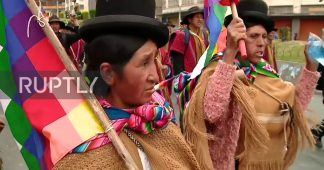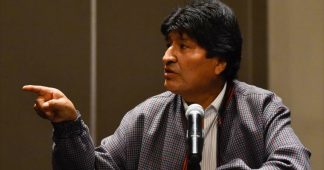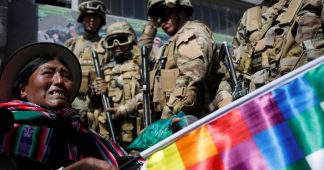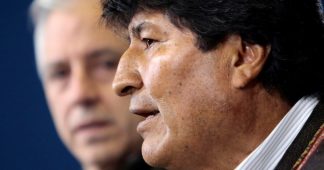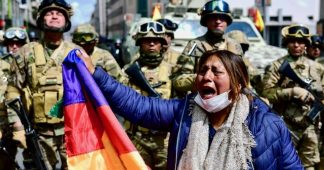By Seth Galinsky
For two weeks workers, peasants and indigenous communities organized protests across Bolivia against the ouster of President Evo Morales. These have wound down for now after a shaky agreement was reached between the new government and the protesters.
Morales resigned and left the country in the face of violent actions led by rightist businessman Luis Fernando Camacho, a mutiny by the police, and calls for his ouster by both the military high command and the Bolivian Workers Federation. They charged that Morales’ victory in Oct. 20 elections was fraudulent.
Senate Second Vice President Jeanine Áñez proclaimed herself “interim” president of Bolivia, saying her priority was to organize new elections. But she immediately launched attacks on working people and indigenous peoples.
She sent security forces against those who protested her takeover, leaving more than 30 dead and scores wounded. She reversed social and foreign policies adopted under Morales, breaking off all relations with the Nicolás Maduro government in Venezuela and pulling Bolivia out of ALBA, an alternative trade bloc to Washington’s domination, led by Cuba and Venezuela. And she stacked her new cabinet with rightists and opponents of the rights of the indigenous peoples. She expelled the members of Cuba’s internationalist medical mission in Bolivia, arresting four on outrageous charges they had fomented rebellion in Bolivia.
The ouster of Morales was met with protests, especially from the country’s indigenous Quechua and Aymara majority, including many who had been critical of him. They marched and blocked roads across the country.
On Nov. 22 protest leaders in the majority indigenous town of El Alto on the outskirts of La Paz signed an agreement with the government. On Nov. 25 a broader national agreement was reached.
Áñez’s government said it would withdraw the army and police from conflicted areas within 48 hours, rescind a decree that granted immunity to cops and soldiers who killed demonstrators and release those taken prisoner during the protests. It said there will be no reprisals against protest leaders or leaders of Morales’ Movement Toward Socialism (MAS).
The Congress — including the MAS, which still holds a majority of the seats — voted unanimously Nov. 25 to hold new elections, although no date was set. It was agreed Morales will not be allowed to run.
But families of those detained and leaders of the protests say that the government is already violating the agreement. And the government’s new interior minister rightist Arturo Murillo has threatened further attacks on MAS leaders. “We’re going to go hunting for Juan Ramón Quintana,” a former minister under Morales, Murillo said. One MAS candidate in the October elections was arrested Nov. 25 after the agreement was signed and accused of being the “intellectual author” of terrorist attacks.
Published at https://themilitant.com/2019/11/29/bolivia-protests-falter-after-deal-with-interim-govt/

